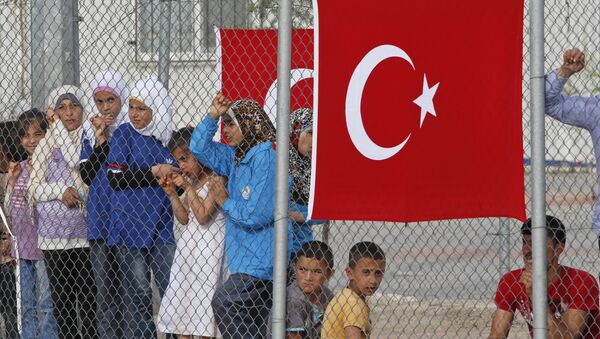The European Commission is negotiating a deal under which "irregular migrants" — those not granted asylum — arriving in Greece after March 20, 2016, are relocated back to Turkey, in return — on a one-for-one basis — for Syrian refugees in Turkey being relocated to EU member states.
Daily Brief: #WorldRefugeeDay — Turkey shoots asylum seekers; whither the #EUTurkeyDeal?
— Human Rights Watch (@hrw) June 20, 2016
https://t.co/HxBCN3v5QK pic.twitter.com/GVMSYfOuYQ
However, the UN refugee agency UNHCR, Médecins Sans Frontières, the International Rescue Committee, the Norwegian Refugee Council, Save the Children and Red Cross — have said the EU-Turkey deal is either immoral or illegal as the 'hotspots' where migrants are processed have become detention centers. They also say Turkey is not a 'safe country' for migrants to be returned to, under the Geneva Convention.
EU: don't send #Syrians back to #Turkey; share load & hear their claims #WorldRefugeeDayhttps://t.co/visPjJ9XSZ pic.twitter.com/1K4vdwCyt5
— Akshaya Kumar (@AkshayaSays) 20 June 2016
In a damning report, Human Rights Watch says the laws and policies governing Syrian refugees' lives in Turkey, however, do not grant them full refugee rights, and the protections these laws and policies do extend have yet to be fully realized. As a result, many Syrians in Turkey still cannot access education, health care, and lawful employment. Furthermore, delays of up to six months in registration for temporary protection mean that some refugees are unable to get basic services and live in fear of being forced to live in a camp or deported.
"As Turkey is host to over two million Syrian refugees it is hardly surprising that many are not getting the support they desperately need to maintain livelihoods. The EU is morally, and indeed legally, obliged to share some of the refugee burden by not sending Syrian refugees back to Turkey without assessing their asylum claims," said Stephanie Gee, fellow in the refugee rights program at Human Rights Watch.
Desperate Delays
One 21-year-old Syrian man said he went five times to two different police stations before he was even able to make an appointment — for a date three months later — to apply for registration. Others said officials imposed requirements for registration that were not specified in the regulation, such as a rental agreement with a landlord.
Syrians of #AzraqCamp make their voices heard underneath the blazing summer sun #WithRefugees pic.twitter.com/VokQJNxTvE
— UNHCRJordan (@UNHCRJo) 20 June 2016
Ali, 21, said that registering for temporary protection in Istanbul was a months-long ordeal. "I went to the police station in Fatih [a neighborhood of Istanbul] last October to get the kimlik. It was so crowded, they told me to come back the next day. I did, waited for hours, and still didn't get an appointment."
"I heard from others that the Taksim [a different neighborhood] police station also does registrations, so I went there. They said come back next week, so I did. They said come back two days from now, so I did. They said come next week. So I gave up. I finally tried again in February, and I received an appointment for [mid-May]."
Jemaa, 23, said of his family-of-four: "When we first went to register, they said it would be a two or three-month wait. We paid US$43 (125 lira) and we all got a kimlik right away."
Turkish Troops Kill 11 Syrian Refugees, Including Four Children https://t.co/gjv2MiDKv4#Turkey #Syria pic.twitter.com/FPxZMWwAgi
— Ian56 (@Ian56789) 20 June 2016
Rama, 19, said she paid a broker to facilitate her registration process because she was pregnant and otherwise might have needed to pay even more exorbitant amounts for crucial neonatal and maternal care during her pregnancy and delivery.


